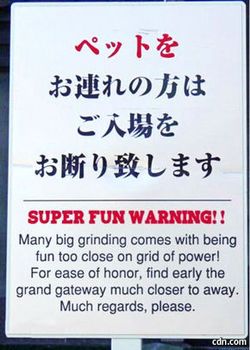英語力アップで経済を活性化 [英語]
Learning English in Japan
Talk like a gaijin
The government hopes to boost the economy with English lessons
Aug 27th 2016

日本政府は英語教育で経済の活性化を図る
イギリスの経済誌エコノミストが「日本人の英語のレベル」についての記事を載せています。
記事の冒頭には「ペットをお連れの方はご入場をお断り致します」という掲示の画像を載せていますが、それを英語にしたと見られる文がすぐその下に書かれています。
どうもその英語はかなりおかしな英文で、英文としても日本語の英訳としてもかなりいい加減な英語になっているようです。
どういう場所に設置された掲示物なのかはわかりませんが、こういうおかしな英文を見たネイティブの欧米人は日本人の英語力に疑問を持つのではないでしょうか。
安倍政権は英語教育制度を改革して、日本人の英語力を向上させようとしていますが、エコノミストはそれだけでは十分ではないと指摘しています。
以下にこの英文記事の内容をまとめてみました。
「日本ではバスや汽車は時間きっかりに到着、運転士の運転技術の正確さには定評があるのに、こと英語力に関しては、かなりいい加減でまったく日本らしいところが見られない。
英語の掲示物にはスペルミスが多く見られ、タクシーの運転手は外国人と話すときはフレーズ集を指さして話をする。英語名が付けられた店名は特にひどい英語だ。
2015年のTOEFLでは受験者の国別では、日本は120ヶ国中71位、東南アジア諸国では最下位となっている(ラオスとカンボジアは除く)。英語が話せる人を求めている企業は留学したことのある人か海外で生まれ育った人を探す傾向にある。日本国内で教育を受けた人たちは入社しても会社であまり活躍してくれないだろうと考えているのだ。
政府はこうした状況を変えたいと思っている。政府は今月の初めに英語教育の大改革を行う計画を発表。これまで10歳の小学5年時から始まっていた英語教育を2年早めて8歳から行うというもの。リーディング、ライティング、文法よりはコミュニケートに力を入れるという。
英語が国際共通語となっている国ではこうした英語教育がこれまで以上に大きな役割を果たすことが期待されている。
「ほかの国の文化を理解し、日本の文化をほかの国に伝えるためにも英語が必要なのです。」と話すのは東京外国語大学の高島秀行教授。安倍晋三政権にとって、特に大事なことは、日本経済を活性化させるために英語が必要だということ。
日本は少子高齢化を迎え、人口が減少する中、海外に市場を求める企業が増えてきていて、海外市場で利益を上げ、優秀な外国人労働者を日本に引き連れるためにも英語が必要となってくる。
政府に頼らずに自社で英語対策を行っている企業も出てきた。ソニー、オンラインショッピング大手の楽天(社内公用語は英語)、カーメーカーの本田などである。
英語教育の手直しだけでは不十分だ。
日本と外国との文化には大きな違いが数多くある。
まず、日本人は英語を使う必要性をあまり感じていない、というのも日本人で海外旅行に出かける人はまれで、英語を必要としない職場で働いている人が圧倒的に多いからだ。アメリカの映画や音楽はヨーロッパ、アフリカ、中東ほどは日本では普及していない。
日本の伝統を重んじる人は純粋な日本文化の継承を望み、大きな変化は望んではいない。
「日本人が英語を学ぶ上で一番の障害となっているのは英語に対する自信のなさである。」と話すのは上智大学の吉田健作教授。
ネイティブ・スピーカーではない人だったら当然するようなミスをするのではないかと日本人は恐れて積極的に英語を話そうとはしない。
英語の発音の難しさに頭を悩ます人も多い。例えば、日本語では英語のLとRの違いをはっきりと表すことは出来ない。日本語に使われている英語の言葉は発音が原語から大きく変わってしまい、ネイティブスピーカーでさえ何のことか理解できないことがある。アイドル、マクドナルド、バレーボールなどがそうだ。
「我々日本人はネイティブスピーカーのように話す必要はないのです。外国人とコミュニケートが出来れはいいのです。」と吉田教授は話している。
★日本人の英語力は東南アジア諸国の中で一番低いと指摘された日本ですが、果たして小学生からの早期英語教育の導入で日本人の英語力を向上させることが出来るのか疑問が残ります。
コミュニケーション能力を養うには、十分な読解力が必要で、リーディングを通して豊富な語彙力・表現力を身に着けることが先決ではないかと思います。
インターネットには英語力向上に役に立つ題材、資料が豊富にそろっていますので、ネットを大いに活用すれば現在使われている生の英語を身に着けることが出来るはずです。
教育制度に振り回されずに、自分のスタイルにあったやり方で学んでいけば楽しみなが英語力がアップすることでしょう。
Learning English in Japan
Talk like a gaijin
The government hopes to boost the economy with English lessons Aug 27th 2016
ITS buses and trains arrive on the dot. Its engineers are famously precise. But when it comes to English, Japan is uncharacteristically sloppy. Signs are often misspelled. Taxi drivers point at phrasebooks to communicate with foreigners. Shops that take an English name to be trendy often get it horribly wrong: witness “Poopdick”, a second-hand cosmetics outlet.
English-speakers are much less common in Japan than in most rich, globalised countries. In 2015 Japan’s average score in the TOEFL, a popular test of proficiency for non-native speakers, was 71 out of 120, lower than in all East Asian countries except Laos and Cambodia. Companies seeking English-speakers tend to look for people who studied or grew up abroad, on the assumption that locally schooled candidates will not cut the mustard.
The government wants to change this. Earlier this month it announced plans to overhaul the teaching of English. Children may soon start learning the language two years earlier, when they are eight instead of ten. Lessons will emphasise communication over reading, writing and grammar.
All this, it is hoped, will help Japan play a bigger role in a world where English is the lingua franca. “We need English to understand other cultures and explain ourselves to them,” says Hideyuki Takashima of Tokyo University of Foreign Studies. And, particularly important to the government of Shinzo Abe, English is needed to boost the economy. Japanese companies, which are increasingly expanding abroad as the local population shrinks and ages, need English to prosper outside, and to attract talented workers to Japan.
Some businesses have taken matters into their own hands. Sony has long insisted that workers be able to explain the workings of its products in English. Six years ago Hiroshi Mikitani, the Harvard-educated boss of Rakuten, an e-commerce giant with operations in 30 countries, decreed that English should become the firm’s main language; it no longer conducts any meetings in Japanese. Rakuten provides tuition in English for all its staff. Honda, a carmaker, said last year that by 2020 it too will make the linguistic shift.
Tweaks to the education system alone will not be enough; cultural barriers abound. Many Japanese don’t see the need to use English because they rarely travel abroad and work in jobs that don’t require it. American films and music are not as widespread as in Europe, Africa or the Middle East. Traditionalists, eager to maintain the purity of Japanese culture, would be happy for things to stay that way.
Kensaku Yoshida, a professor at Sophia University in Tokyo, reckons the biggest obstacle is a lack of confidence. Many Japanese are so embarrassed by the inevitable mistakes that a non-native speaker makes that they prefer not to try at all. Many also struggle with English sounds: their language does not differentiate between “l” and “r”, for instance. The many English words used in Japanese are often so changed as to be unrecognisable to a native speaker: aidoru (idol), Makudonarudo (McDonalds), bareboru (volleyball). “We need to accept that we don’t have to talk like native speakers,” says Mr Yoshida. “We just have to communicate.”
From the print edition: Asia




コメント 0